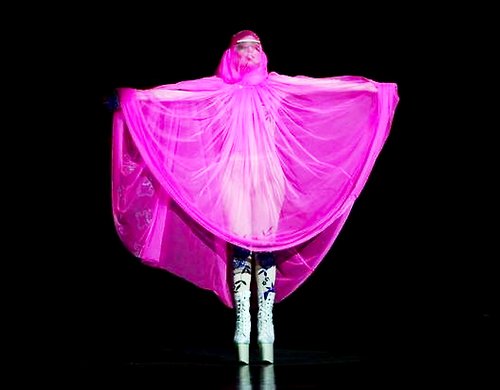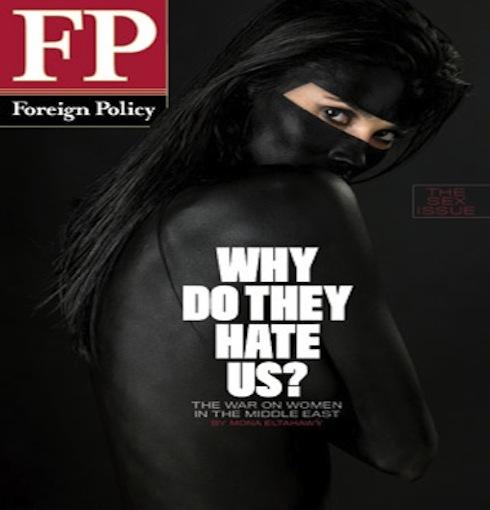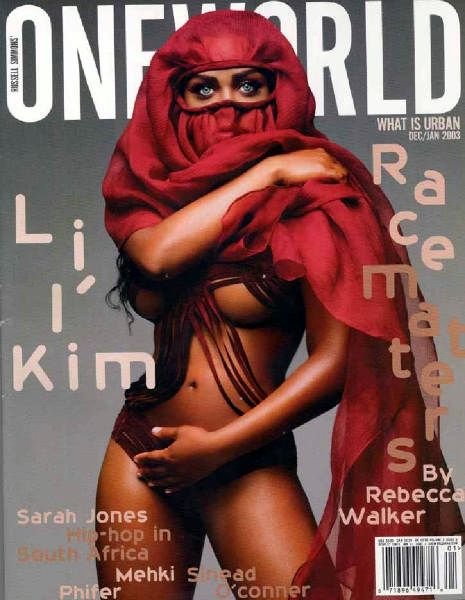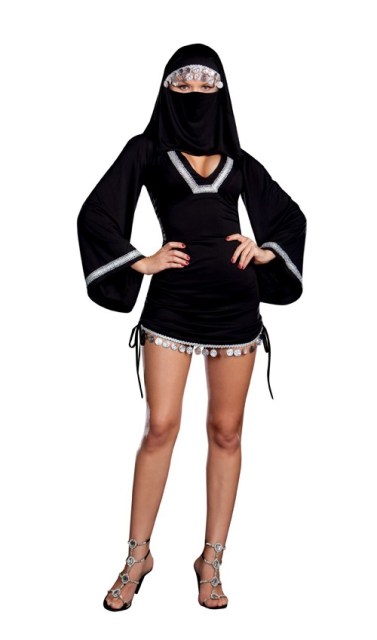
It starts on October 2011. Egyptian blogger Alia Magda Elmahdy pohsts a photo of herself nude, along with a barrage of nude artwork and a message:
“Put on trial the artists’ models who posed nude for art schools until the early 70s, hide the art books and destroy the nude statues of antiquity, then undress and stand before a mirror and burn your bodies that you despise to forever rid yourselves of your sexual hangups before you direct your humiliation and chauvinism and dare to try to deny me my freedom UPof expression.”
At the time, street harassment was at a fever pitch, the military was forcing “virginity tests” on female dissidents, and there was no organizing around it.
What she did was comparable to the actions of Mohamed Bouazizi, the man whose self-immolation in Tunisia a year earlier started Arab Spring. Both used their bodies to shock society out of complacency and towards change. After Elmahdy’s statement, Egyptians began holding rallies against sexual violence, and demanding greater accountability. Virginity tests are now over.
However, while Bouazizi has been lionized across the Muslim and Arab world, Elmahdy was vilified (even by liberal secularists), received death threats, and was forced to leave the country. Egypt still has a long way to go with women’s rights.
Let me be frank: I’m a first generation Egyptian-American. My entire extended family lives in Egypt, including aunts, cousins, nieces, and in-laws. The issue of how women in Egypt are treated is a very personal one. Because of this, I supported Aliaa Elmahdy, and hated the craven way Egyptian liberals disavowed her in a cheap bid for votes. I may never live to see her get her due in Egypt, and that’s shameful.
The following year, she joined Femen, a Ukraine-based feminist organization, which specializes in “sextremism” as a means of political action. And, earlier this year, Amina Tyler, a Femen activist in Tunisia, posted a nude photo of herself online, with the message “My body belongs to me, and is not a source of anyone’s honor,” on her chest.
There’s been growing anxiety about the rise of (often violent) jihadism in Tunisia, as well as the increasing censorship of the Islamist government. Like Elmahdy, Tyler also received death threats, while a leading cleric called for her to be flogged and stoned.
A solidarity protest was called for April 4. Femen declared it Topless Jihad Day. Activists posted topless pictures of themselves from around the world to Femen’s facebook, and held topless rallies across Europe.
In response to Femen, Muslim women created a Facebook page called Muslimah Pride Day, and Muslim women sent pictures of themselves holding up index cards with a simple message.
“Femen does not represent me. I don’t need liberating.”
The page was covered by al Jazeera. Pamela Geller denounced it. And it was supported by countless Muslims, including many queer and progressive Muslims.
Including me.
Unpacking this issue relies on understanding one thing: Muslims are not monolithic. Muslims in the West (Europe, Canada, America) face a different set of challenges than those in the Middle East. And hence, they’re going to react differently to those circumstances. You know, just like everyone else.
In the West, neither Muslim nor non-Muslim women would face what Amina Tyler has. Nudity is, at most, considered a misdemeanor.
However, there’s also a strain of Western culture which sexualizes Islam and Muslim women. It dates back centuries, with exotic (and often fictional) accounts of the ‘sensuous Orient’.
In modern times, it revolves around the Muslim clothing, specifically, the hijab, nikab and burqa. Wearing any exposes one to harassment, even by law enforcement. Bans on burqas and hijabs have been proposed – and enacted – by Western and Western backed governments in the Middle East. And where there aren’t laws, there’s culture. The “naked burqa” trope (where traditionally Muslim women’s clothing is sexualized), is very

very,

very,

very,

common in the West.
And you can add Femen’s recent topless activism to that list. Context matters. You can’t disconnect actions from the longstanding cultural environment it came from. When Elmahdy and Tyler went naked, they were protesting specific groups dictating policy in their home countries. Activists in the West don’t have that context. Railing against Islamists here means attacking an immigrant group while reinforcing centuries’ old prejudices. And when you use Islamic symbols as part of your protest art, you put them out of reach for non-traditional Muslims.
The adoption of Islamic symbols in non-traditional contexts is an integral part of queer Muslim activism. Last year, I painted a crescent moon on a rainbow flag: a way of asserting both my faith and queerness. However, as proud as I am of that flag, I’m reluctant to bring it in public anymore. I’m worried it would be too associated with Femen. That’s what happens when your activism gets co-opted: you lose a means of expressing yourself.
And it’s not just queer Muslims. Femen’s activism fails to understand Western Muslims as distinct from their Middle Eastern counterparts. And the result is that Western Muslim women found themselves silenced. Muslimah Pride was a means of re-asserting that voice, if only in a cursory way.
Yet, for all of my vitriol at Femen, my initial enthusiasm for Muslimah Pride has faded.
Muslimah Pride was a Western Muslim women response to a Western protest. Fair enough, but their back and forth with Femen offered, at best, a cursory mention of the circumstances that led Elmahdy and Tyler to do what they did. It’s wrong to imply that Alia Elmahdy somehow went wrong by joining Femen. Femen’s tactics are absolutely necessary in the Middle East, and its support there is growing
And no, I don’t need liberating. But Amina Tyler does. She’s currently begging for political asylum, and worried about her safety. What is Muslimah Pride doing to organize on her behalf? What Muslim organization is? If Muslims can’t protect one of their own, how can we have indignant pride?
The sad truth is that the people sidelined are the ones putting their bodies, and lives, on the line. I’d hoped the Arab Spring would bring more attention to Middle Eastern voices. Instead, Western voices have appropriated that identity as their own, and continued to ignore them. Elmahdy’s blog is still active, and it’s amazing trove of information and artwork. And no one, either in the press or the dozens of opinion pieces about this, has linked to it.
Well I am, as well as the Facebook page for Femen Egypt & Femen Tunisia. Go to these sites and hear the voices of these women for yourself.
After all, it’s what we’re fighting for.
UPDATE: At the time this article was written, Amina Tyler was being forcibly held by members of her family, in relation to her pictures. Since then, she has managed to escape, and is, by all accounts, safe. You can hear about her ordeal here.
About the author: Miriam lives and works in Texas, and currently blogs for I Am Not Haraam. She’s not very good with bios.

THANK YOU THANK YOU THANK YOU ZOMG THANK YOU SO MUCH.
I am totally with you on this, and it’s sad that you are one of the very few who share this in-between position. I was very frustrated with both FEMEN and Muslimah Pride because it felt like a false dichotomy – Islam is all horrible or Islam is all liberation.
I grew up Muslim. In Malaysia I still am, legally. I don’t feel liberated by it. There’s a lot about Muslim politics (at least in Malaysia) and theology that I have quibbles with, though also some that I find comfort in (my current spiritual alignment is fuzzy). At the same time, I can’t get behind “Nudity does not liberate me”, because for me, it *does* – being openly erotic, sexual, just NAKED is a really strong statement given my context, given my body, given all the sources within and without that *do not* want to acknowledge my body or my existence.
I mean hell, I just read yesterday an article about Sooraya Graham, who did an art piece just about being real about Islam and gender (a woman in burqa holding up a bra in a kind of laundry setting). All she wanted to do was show that Muslim women, whatever their garb, were regular women with pretty similar concerns. Yet she got so much hate and harassment from *other Muslims* who felt that her work was offensive – to the point that she had to leave art school, move cities, be medicated for mental health concerns, and now feels like she has to let go of art and Islam – things she felt most comfort in before.
Yet the response to that, if FEMEN is any indication, would probably be less about her and more about “See?! Islam is ALL SORTS OF BACKWARDS!” and then they’ll be taking over space and getting all the attention for how ‘enlightened’ they are. Even now Amina’s being forgotten.
As you said, we’re being co-opted. There is no gray area, no space for complicated complex discussions, no real way to do activism our own way without it being associated with a side we’re unhappy with (doesn’t help that FEMEN is also notoriously anti-sex-work). No one speaks for us – and when we do try to speak for ourselves, our mics get stolen.
I wrote about my ambivalence here (NSFW – toplessness):
http://notyourexrotic.tumblr.com/post/47174679111/so-ive-been-following-the-whole-femen-topless
How have I not been following you?
Likewise! I think I’ve come across your blog before but it’s so going in my RSS reader now.
I really don’t like FEMEN, and I’m irritated by the fact that I have to constantly jump to their defence re: their view of sex work, but just the fact that everyone constantly goes on and on and on about how terrible it is that FEMEN are ‘notoriously anti-sex-work’, but nobody ever mentions how notoriously anti-immigrant sex workers rights movements / groups can be is infuriating as hell. It’s not like FEMEN’s critique is especially nuanced or helpful or like most FEMEN members are lower class immigrant women so it’s annoying to defend it, but I think, by and large, when we (Eastern Europeans) look at sex work we see different things from Westerners, we especially see decades of Western sex industry out-sourcing violent porn to Eastern Europe, we see mail order bride schemes and human trafficking rings and millions of women leaving their countries to do very poorly paid physical labour intensive jobs in the West so they can send money back to their families etc etc – we see the way this systematic exploitation props up Western women’s financial independence the way it props the rest of Western economies – most sex workers in Europe are immigrants and sex work is part of this wider network of exploitation of cheap immigrant labour which affects us and Westerners don’t seem to want to understand this and the way it makes us suspicious of their pro-sex work rhetoric and sex work more generally oh etc etc etc.
ell you’re telling this to another immigrant, and immigration rights are a particularly sensitive topic for me – I get that a lot of even the more progressive groups have some really shitty ideas about migration. Oh boy do I know.
But it seems to me that FEMEN’s approach to sex work is like FEMEN’s approach to Islam: make it all about them, demonise *the entire group* as being inherently fucked, attack those involved in those groups (for whatever reason), be condescending towards their supposed victimhood, deny people in those groups agency, and take over their voices. Not helpful, to say the least.
Regarding FEMEN’s approach to sex work, I’m think it’s actually even worse than that. There is a video out there of a FEMEN action in France where one of their activists physically shoves a sex working woman out of the way as their organization takes the stage. Think about that for a moment… how misguided do you have to be to physically assault another woman as part of an action for “women’s liberation”?? Does FEMEN imply that shoving a woman is something that’s ok under certain circumstances???
I’m not Muslim so my opinion on some of these other issues probably isn’t so important, but that one has me really infuriated. (although, Miriam, fwiw I appreciated this post).
Food for thought. Thank you for sharing this.
So so good. Thank you so much for writing this and for hitting all of the necessary points. I’ve been struggling with a back-and-forth inner debate on my feelings towards Femen, Muslimah Pride, and the general forgetting of, like you said, “the very people [sidelined by] putting their bodies, and lives, on the line to protest repressive policies.”
Very well done!
great article, thank you!!
thank you so, so much for this, i couldn’t articulate my feelings as both a first-gen westerner and a queer middle eastern woman, but you captured my thoughts perfectly.
I’m familiar with “I Am Not Haraam” so I’m really pleased to see this article here on Autostraddle, Miriam! Thank you so much for this much needed perspective on Femen v Muslimah as setting up this binary of Islam GOOD/Islam BAD hurts constructive dialogue and avoids the nuances of different Muslims’ experiences. I myself have a really complicated relationship with Islam, as I can see the damage it has done to both my parents but don’t want to deny any one person’s autonomy to practice the religion of their choice. Like others, I felt a lot of difficulty articulating my thoughts on this as I’m a first-gen westerner & a queer middle eastern person, so this article was really great in helping me navigate the issues. Thank you.
I appreciate this article, especially this: “Muslims are not monolithic”. my partner is Muslim, and from her I’ve started to learn more about Islam as a religion, how it’s misrepresented in the West (i.e. made to seem monolithic), and how it’s not necessarily mutually exclusive to be queer, feminist, and Muslim.
there’s nuance in everything, y’all! big shocker, I know. whether it’s religion, culture, sexuality, gender–humans are complicated beings, there’s never just 2 sides to a situation.
I feel like your article leaves a little to be desired. I honestly don’t really understand your point.
You seem pro-femen and pro-muslimah pride, but isn’t the latter a push-back against the former?
She’s saying that even though there’s plenty in both groups to admire, there’s also a lot of fuckery that’s going relatively unnoticed – and there’s a whole middle group of ambivalent people who are going unheard because of the false dichotomy. You can be pro-a group in theory and still be critical of them.
SALAAMS EVERYONE I LOVE YOU ALL SO MUCH AND JUST THIS ARTICLE AND BRINGING OUT ALL THE QUEER MUSLIMS FROM THE AUTOSTRADDLE COMMUNITY CAN I JUST HUG EVERY SINGLE SOUL OF YOU COME HERE COME INTO MY BOSOM AND LET ME TELL YOU THAT YOU ARE WONDERFUL!!! Sorry, I just, I get really excited when I meet/hear about other queer Muslims and especially other queer Muslim women and just I love all of you a lot and it means a lot for someone my age to have role models and people out there like me and especially thank you for talking about non-Muslims/white women appropriating the statements and movements from progressive and queer Muslim women because YES YES YES and just- YES. Ahem.
Hahaha I know your excitement!
Have you seen the documentary A Jihad For Love? Or Children of Srikandi? The first is about LGBT Muslims around the world (including queer women) while the second is specifically about queer women in Indonesia, including one story about the intersection of Islam and sexuality. I’ve only seen the trailer for the latter, don’t know how to see the whole movie, but it’s great stuff.
i am queer but not muslim- i want to know how i can support. are there specific organizations or movements (besides femen) that i should avoid/support/follow? are things such as MIA’s video bad girls offensive, even though the point of the video was to protest the ban on women drving in saudi arabia? i want to be an educated supporter of women and not a detractor. i recognize that intent does not always justify, but i’m too ignorant to understand the cultural stuff here.
Promoting the voices of women like Miriam helps – voices like ours are being lost and signal-boosting our efforts goes a long way. I don’t know if it’s necessarily a case of completely boycotting or supporting any specific group; they all have benefits and problems. The more important thing is to keep a critical eye and keep your resources diverse and balanced – just about every issue is more complex and complicated than Good/Bad.
noted! i appreciate both the advice and quick reply. i want to do more research here. i’ll have to follow you and miriam! thank you!
I’d say the best thing to do is listen, and learn. Femme/queer Muslims will have to fight for their rights themselves. But that won’t happen unless there can be a full and honest discussion about it. And that hasn’t happened because everyone’s just been talking at us. It’s all one way.
And that applies to me, too. My assessments of Femen Egypt and Femen Tunisia could be completely wrong. I’d be happy to admit if I am. But I won’t find out unless I try and listen to Egyptian and Tunisian voices. I put the links to those sites for that reason.
I try to make it a policy in life to listen more than I speak. I don’t think you can ever go wrong in a political discussion by listening. Def. keep a critical eye, but listen.
I was teaching in an all-girls catholic school with very little diversity and one of many things that came up on Women’s Day with my 11 year olds was the status of women in Islamic countries. It was really hard trying to keep them open minded when I can’t speak for any Muslim since I’m not one, but the more I read from Muslim women’s perspectives the better job I’ll do, I hope. This comment is all over the place, I just woke up, but thank you!
this is excellent, thank you :)
I became a more enlightened person today! :) Thank you again, Miriam!
This comment has been removed as it is in violation of Autostraddle’s Comment Policy.
Salaams!
Hey, to everyone who’s said something hurtful: I understand that ignorant appropriation of the issues faced my Muslims- and the actions of FEMEN in particular is a very emotional topic, and that it can be frustrating as a Muslim, and especially as a Muslim woman, to feel like you are under attack from within and without your religion, and from both ends of the political spectrum– but let’s remember to be kind to our sisters. If there is misinformation in this article, let’s try to confront what’s problematic about the information, rather than the author- who, as a queer, trans, Muslim woman, faces hateful treatment every day of her life.
And, if your problem is actually with the aforementioned identity of the author rather than with what she is saying, the please know that if you have a problem with her, you have a problem with me- and you’ll have to go through me first, because I won’t see my sisters in Islam and in the queer community attacked.
Salaam,
Thank you for this. You don’t know how much it means to me.
The truth is, the situation has changed since this article went to print. I’ve sent a relevant update to the website, so hopefully it’ll be posted soon.
Not true. Many of the facts which I have mentioned were already accessible before you wrote the article .. so “the situation has changed” is not an excuse.
What Queer muslims??? Does that even make sense?
I don’t know whether you are a muslim yourself, but if you are, can you tell me please : is homosexuality accepted in islam? What does islam say about it?
And I am not asking your ‘personal’ opinion here?
Cause you know, some people justify marrying a 10 year old girl based on their ‘personal’ opinions of islam!
funny how the author removed my comment where I proved her complete ignorance about simple facts about this story and especially Amina the “Tunisian” ..
This is freedom of expression … or should I say hypocrisy of expression.
I don’t decide which comments remain and which ones don’t. For what it’s worth, I’ve written the staff asking it to be reinstated, in the meantime I’ll respond to you on my own blog, and link it here.
Looking forward to your justification of posting wrong information, and to your answer on my question to Q above.
I know it’s late, but here is the last thing I will say on the subject. Also, if anyone has a problem with my being queer, I suggest they take it up with Allah. I certainly didn’t create myself.
http://coming-2-terms.tumblr.com/post/55767759149/femen-vs-muslimah-pride-an-faq-response
Also, I should point out that I misinterpreted the meaning of first and second-generation. I am the latter, not the former.
Better late then never!
I am not sure whether the link you posted was the right one, but I see that you corrected almost nothing of the misinformation you posted in this article here.
You said :
“I don’t need liberating. But Amina Tyler does. She’s currently begging for political asylum, and worried about her safety.”
I showed you a video from May 1st that shoed Amina attacking a political rally of some party she does not agree with, meaning that she was a threat to others and not the other way around. But you ignored that piece of information.
I showed you links to video by her aunt and her sister denouncing what she did and showing documents proving her mental health issues, you still ignored it.
So when you say : “The article has since been updated”, you are again misleading your readers.
Plus, you cited four events that happened in Tunisia lately, and used that to paint a picture of Tunisia as if it was Afghanistan or Somalia. Know that the number of deaths from gun violence in the US alone in one month is orders of magnitude higher then all the possible non-lethal violence in Tunisia in years. Many women have been beaten almost to death just because they wore the veil in france in the last year alone. You say you don’t have Ansar Sharia in the US but you had many bombings in which civilians were killed, the latest one is the one in Boston, so what you have is far more dangerous than Ansar asharia. You say we do not have Pamela Geller in Tunisia but you ignore that we have worse than Pamela Geller : Olfa Youssef, Raja ben Slama, Essghayer Wlad Ahmed, etc. These are well known islamophobes in Tunisia. Of course Pamela Geller’s friends will never admit she’s islamophobe, they call her a free thinker.
I mean for God sake why are you so misinformed about the subjects you write about.
//Railing against Islamists here means attacking an immigrant group while reinforcing centuries’ old prejudices.//
Unless all Muslim immigrants are Islamists, no, it does not. Islamism is a political ideology, and as such, is fair game for criticism and mockery.